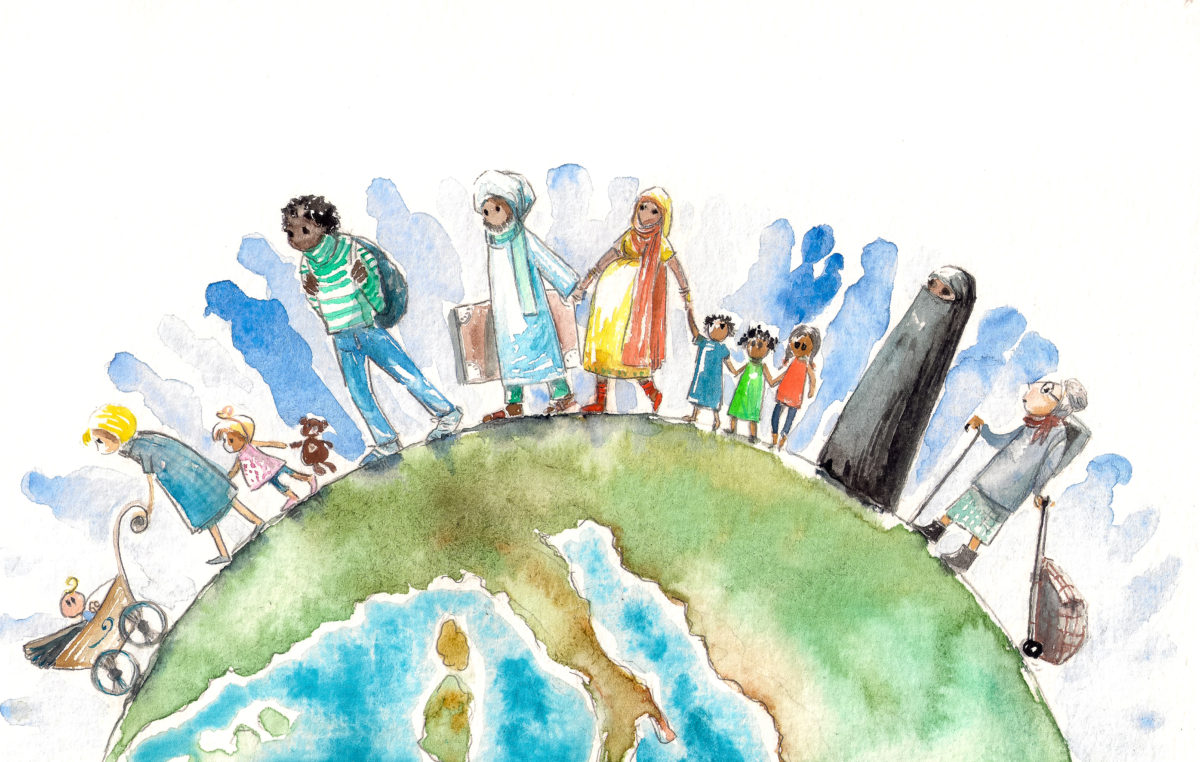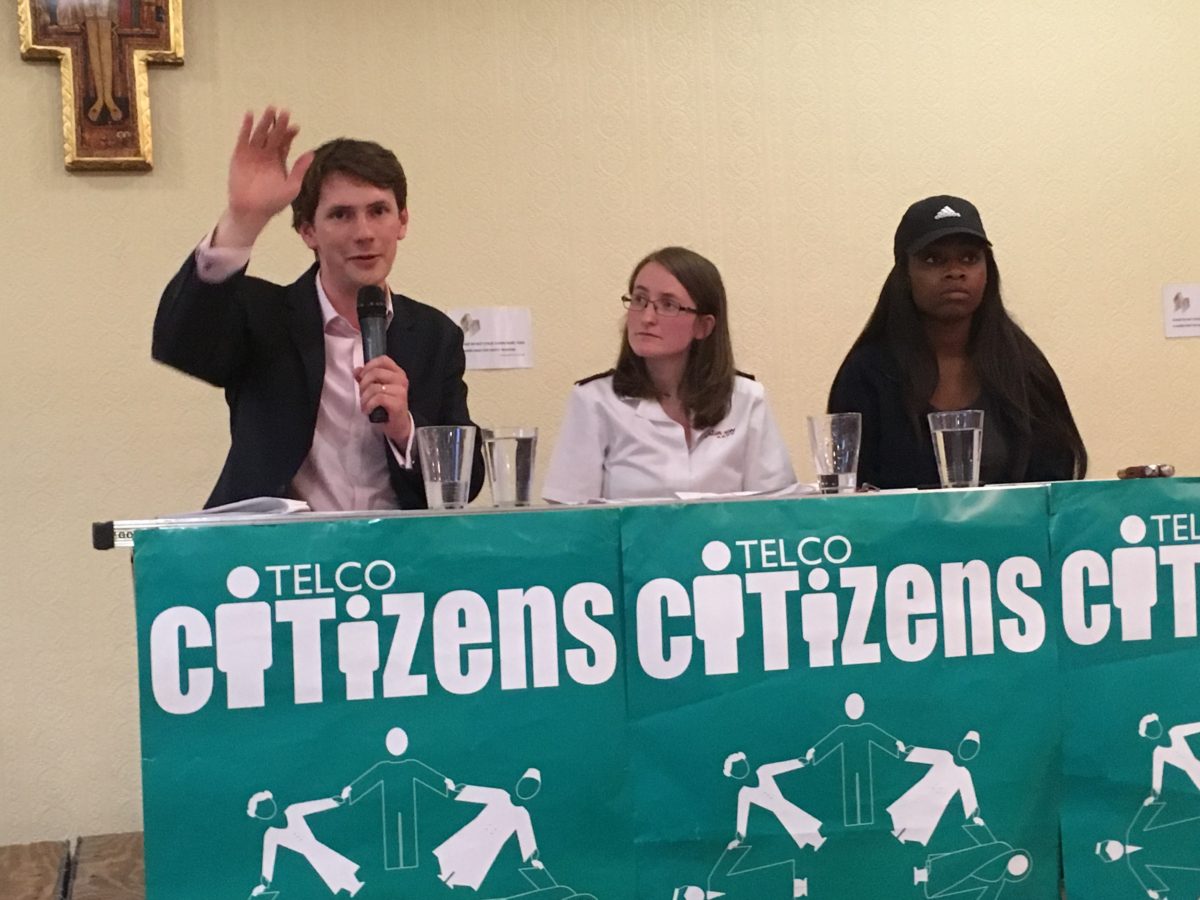Major Jonny Smith hosts a conversation on Facebook Live on 7 May 2020 with three Salvation Army corps leaders – Captain John Clifton (Ilford), Major Estelle Blake (Oldham Fitton Hill) and Major Nick Coke (Raynes Park). They explore themes related to mission, justice, community organising and the local church through stories of hope and transformation.
Category: Theology
Refugee Week 2019: Phoebe’s story – ‘Being an asylum seeker does not define me.’

By ‘Phoebe’
Four years I arrived at Heathrow Airport with my eight month old baby. We had travelled for six hours by plane and six hours to the airport from my home state in Nigeria. I had come to the UK to find safety after we had to leave our home because we weren’t safe there anymore and my family couldn’t keep us safe if we stayed in the country.
As we stepped into the airport I felt lost. I didn’t have anyone to meet me and I didn’t have much on me. I didn’t know how expensive life in the UK was. I tried to get a taxi but couldn’t believe how much they cost so tried to bargain about the cost. It’s funny now but it wasn’t then.
In the coming days I stayed with some relatives of my mum and I started the process of claiming asylum and found a lawyer to help me. But I couldn’t stay there because she was hearing bits of why I’d had to leave home and she wasn’t comfortable with us in the house. This was really hard. I didn’t know where else to go as she was the only person I knew in the UK. I felt so alone but I kept going because I have to be there for my child.
My lawyer called the Home Office and they said they couldn’t help us and I needed to go to the nearest police station. I was so scared. I thought they would arrest me or take my child away. But I had nowhere else to go. Eventually, they took us to a bed and breakfast in north London. When I got that room I was happy because at least it was a roof over our heads and a bed to sleep in. Everyone in the B&B was in temporary accommodation. This was the first place where I made friends and I’m still best friends with one of the ladies I met then.
My faith has always been important to me and so I quickly tried attending the local Catholic church, as I had been raised a Catholic back home. I invited a new lady in the B&B to come with me to church but people there weren’t really welcoming to her children and sent them away because of the children’s disability. I didn’t feel I could go back there after that and so tried the church across the road. This was The Salvation Army. It was a small church but it soon became our new home. The second Sunday we walked in and everyone greeted us by name. It meant such a lot. We were all alone and yet someone cared enough to remember our names. They hugged us. This was the first place that we actually felt welcome in the UK.
We stayed in that area for six months. Every two weeks I had to go to London Bridge to sign to prove I hadn’t disappeared undergound. Nobody could help me with the application for support from the National Asylum Support Service, known as NASS, so I was always in the library. This was hard. My child would be screaming and I would be trying to type my application as this was the only place I could do it. We were living on £20 a week from the council but half of this was going on the travel to sign at London Bridge. The health visitor helped me to get some food from the local food bank and another family in the B&B, who were slightly better off us, would share their food with us.
Eventually my application for NASS support was accepted and they provided us with some accommodation in another part of London and NASS subsistence allowance. Our accommodation is a single room for us to eat, play, study and sleep in. We have to negotiate with other families in the house for access to the shared kitchen, laundry and bathroom facilities. We receive a total of £72 a week to provide for all our other needs: food, clothing, medicine, travel, toiletries, study materials and phone bills. There is little left over to save for unexpected costs.
People at the corps told me there was a Salvation Army near to my new house but we kept going back despite the cost of travel because when you don’t have too many connections you don’t want to let go of good relationships when you don’t know where you’ll be next. I’d already had to leave my family and friends in Nigeria, I didn’t want to lose my new church famiy too.
Eventually one of the ladies told me she knew the officers in my new area so I decided to try the toddler group. I really liked it the first time I came because it was a big room and they didn’t have to turn people away like at so many of the children’s centre groups in the area. I got to know the people running the group and discovered it was a Salvation Army thing to be welcoming! So I started coming to the toddler group regularly. As the corps officer picked up a little about my situation she made it possible for me to attend the group for free. £2 doesn’t seem like a lot but when you only have a small amount to live on, it is. The corps also runs a Baby Bank, which helped me with clothes, toys and equipment for my child. They’ve also helped me with oyster costs to visit from solicitor, food parcels and clothing for myself, as well as a nursery deposit when my child was able to start nursery.
Eventually, I began attending the local corps on a Sunday too because now I had family here too. When my child was three I bought a birthday cake to church and wanted to celebrate with our family at church. I was just about to go and light the candles to bring it in when I turned round and saw that a friend had done it for me. It made me feel like I was at home, with my family who just help without being asked.
My first application for asylum was denied. I felt awful. I had hoped that soon everything would get better and now it seemed it would get worse. The Home Office said my case wasn’t strong enough and I should return to my country. My solicitors were able to appeal and my corps officer wrote a letter explaining her understanding of my situation. She also came with me so that she could look after my child while I went into courtroom. I didn’t want to leave my child behind with a babysitter because I was scared they would take me away and separate me from her. You can’t imagine how much it means to have someone safe to look after your child nearby when you’re attending court.
My appeal was denied. When I first got the letter I didn’t want to tell anyone because it hurt so much. I had been expecting to tell good news and then it was the opposite of what I was expecting. It broke my heart and I didn’t want to break other people’s heart. Over the past four years I have seen other people around me – my neighbours and my friends – receiving leave to remain and being able to move on with their lives. I am still waiting. I need to make a fresh application and have some new evidence to add but the task of starting again and looking for a new solicitor feels so daunting. I am tired of fighting. I am tired of waiting. I am tired of my dreams for me and my child being put on hold.
But I am a person of faith. Being an asylum seeker does not define me. Jesus Christ defines me. I am using this time to learn at college and develop skills for the future. I dream that when this is over, I can train as a midwife and care for women in their moments of pain.
I am an adherent member of the Salvation Army and sing in the worship group. I help in the Baby Bank and our charity shop, and am part of the team who make Messy Church happen. People at the corps see something in me that I can’t always see myself. They encourage me to use my gifts, even now while I am waiting.
The first time that I helped in the Baby Bank I was really happy – and quite jealous of the family worker who gets to do this for her job! I knew the process because we’d filled out the forms before. As the lady I met told me her story, I recognized so many things. She was living through the same experiences as us. I didn’t know there were other families like mine. I thought it was just us and I felt so happy that I was able to help her. We’re not the only ones. Before I felt like I was a problem person but I know now that there are so many people like me who are bravely living through difficult times because we trust that the UK is a safe place for people who have lost everything.
Phoebe is a member of a Salvation Army Corps in London.
Meeting Christ in a night shelter: a post-Easter reflection on a Maundy Thursday evening
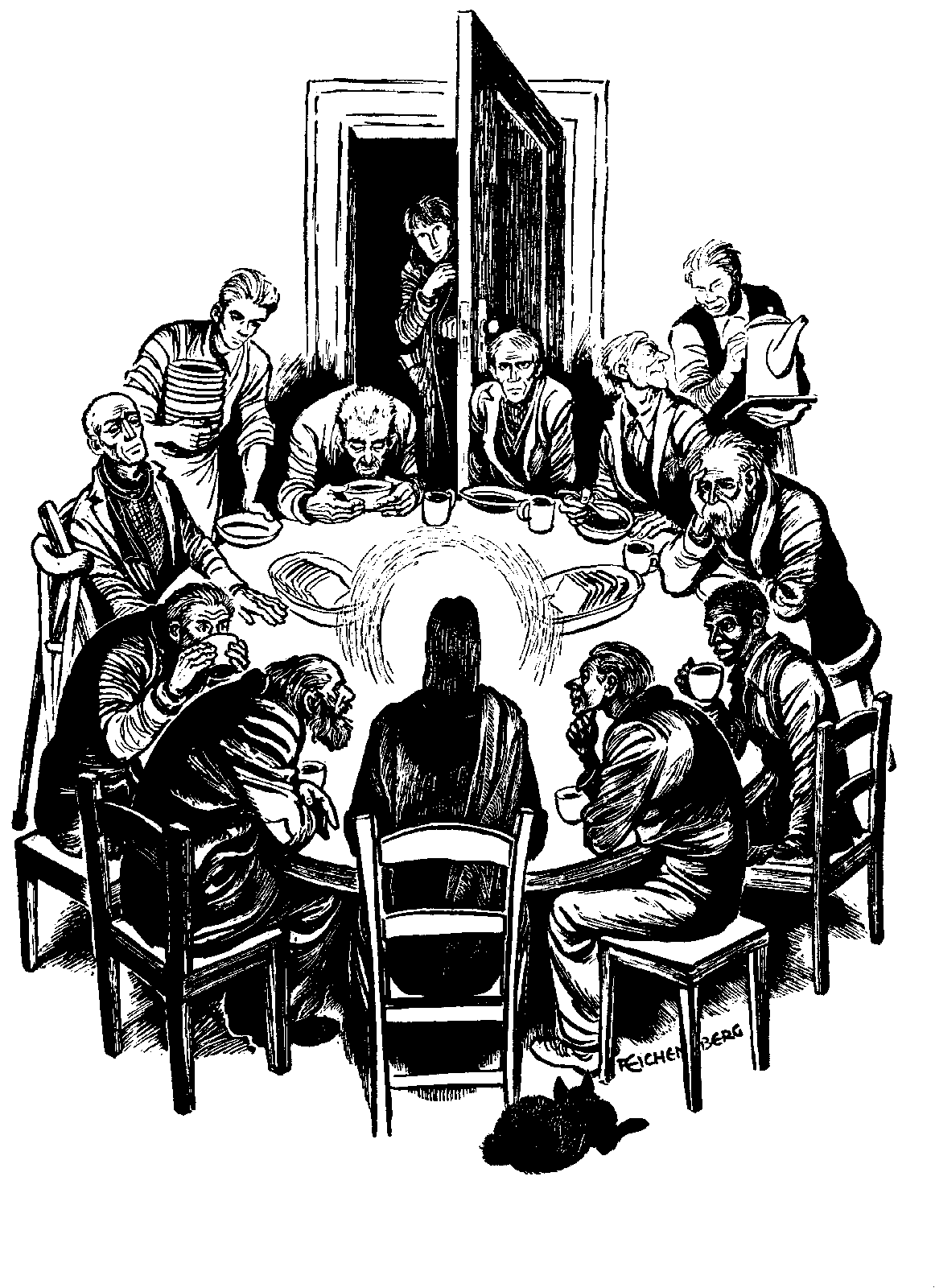
For the last eight years at Ilford Salvation Army we have run a night shelter over the winter season. This typically runs from the first week of December to the first week of March, sleeping 28 people every night in the upstairs hall of our church building in Clements Road. For the last couple of years, we have been working on an initiative called Project Malachi to develop a ‘pop up hostel’ using a modular, re-deployable building (like shipping containers). We are excited that manufacturing of the units has begun, and the building is scheduled to be completed later in the year. However, we were hoping it was going to be completed sooner but in light of some delays we pledged to keep the shelter open until people move in to Malachi. This was a big commitment for the church and volunteer team.
One of the unexpected blessings of running the shelter on an extended basis this year has been that it has been open over Easter. Because the shelter is typically open over Christmas, we make natural associations between that festival, the homeless Jesus and the shelter ministry. This year, we had the opportunity to be more closely attentive to the grounding of this work in the Easter story. An example of this was on Maundy Thursday.
We had scheduled to watch the Passion of the Christ followed by a Love Feast. However, the shelter was slightly low in numbers for volunteers at the shelter due to some having commitments at their own churches. With a low turnout to watch the film, we thought that a better use of our time would be to help with the shelter, and then gather later for the Love Feast. Before opening shelter, we gathered for prayer and shared a reading from John 13 and the new commandment ‘that you love one another. Just as I have loved you, you also should love one another. By this everyone will know that you are my disciples, if you have love for one another.’ This also prefigured the Love Feast later in the evening.
The evening was a little bit chaotic, with some people ‘under the influence’ but the team embodied that new command with meekness and strength. We fed the hungry – people desperate to eat the food (which had been kindly prepared by Muslim colleagues offsite and then delivered to the shelter); we gave drink to the thirsty – teas, coffees and juice quickly consumed; we clothed the naked – one of the men was needing a new pair of work boots after they had been stolen from where he stored them; we welcomed the stranger – a Salvationist from Ghana visited the Corps for the first time; we visited the imprisoned – one of the guests was discharged to shelter inappropriately by probation services (an issue we are having to battle hard to resolve); and we visited the sick – late in the evening, a lady was brought to us because ‘The Salvation Army will know how to help” – she was suffering with dementia and was found wandering in a park after ‘escaping’ from her supervised accommodation. All the members of the team worked together to help everyone who was in need. It was an interesting evening but, nevertheless, a blessed one!
At around 9:30pm, once things had quietened down a bit, some of us – both volunteers and guests – gathered in the main hall for the Love Feast. As we sat together, readings were shared from Scripture to help us focus on the love that God has for us, and our own need to be able to love more, and better. As we ate and drank, I found my attention drawn to my own vulnerability and frail human condition, and the way that I embody the conditions found in Matthew 25:31-46, inasmuch as they were visible in people who would be sleeping in the shelter that evening.
Without diminishing the particularity of my, or their, situation, our common humanity – humanity common with Christ, was realised yet again: “I give you a new commandment, that you love one another. Just as I have loved you, you also should love one another.”
It is in this sense that we find the work of the shelter, and any other enactment of embodied compassion – to be a practice of discipleship. Through our simple desire to be with and imitate Him, we are shaped more and more into His likeness.
Refugee Week 4: 3616 miles – making the journey from Tehran to Ellesmere Port
By Laurence Sandman (adapted and updated from a blog originally published on The Whole World Mobilizing, with permission)
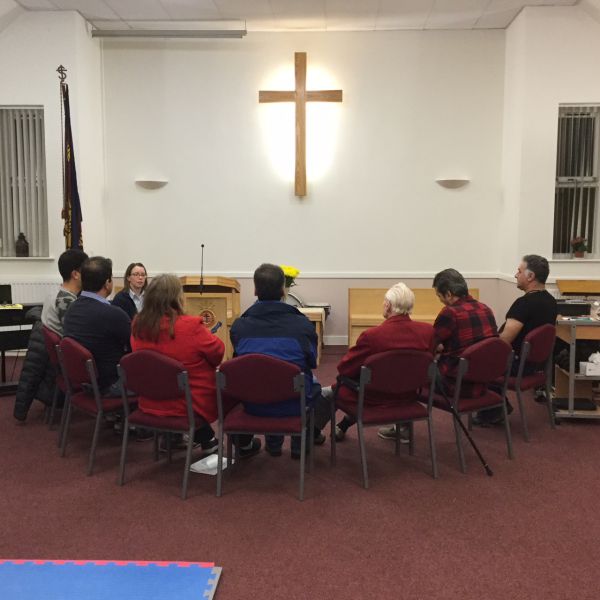 3616 miles. 5820 kilometres.
3616 miles. 5820 kilometres.
It’s a simple matter to type a departure point and a destination into Google and it tells me that it is 3616 miles or 5820 km and will take 61 hours by car. Easy.
Departure point: Tehran, Iran
Destination: The Salvation Army, Ellesmere Port, UK
Distance: 3616 miles / 5820 km
Duration of journey (by car): 61 hours.
Easy.
Easy?
As great and, I’m sure, as accurate as Google maps is, the figures don’t reflect the real world for real people. They certainly don’t even scratch the surface of the circumstances, the conditions and, above all, the emotional struggles of those who, as Christians and other faiths, find themselves in such desperate straits that a long, dangerous and uncertain journey seems the only way out.
Easy? Certainly not.
Continue reading “Refugee Week 4: 3616 miles – making the journey from Tehran to Ellesmere Port”
Refugee Week 2: ‘And they started to come…’ – welcoming refugees at Bootle Salvation Army
By Captain Annette Booth
 A year ago, I attended a meeting about asylum seeking in the UK and learnt that many people were being housed near me in the North-West of England by the Home Office. Individuals and families were placed in shared accommodation, most with little English language, whilst they awaited their asylum decisions.
A year ago, I attended a meeting about asylum seeking in the UK and learnt that many people were being housed near me in the North-West of England by the Home Office. Individuals and families were placed in shared accommodation, most with little English language, whilst they awaited their asylum decisions.
I asked what the best way was to make contact, and was told to knock on doors and ask people directly. I went home dismayed and began to pray that God would help these hidden people find their way to us, at The Salvation Army Corps in Bootle.
And they started to come….
Refugee Week 1: Why Should Christians Welcome Refugees?
by Lieutenant Sam Tomlin
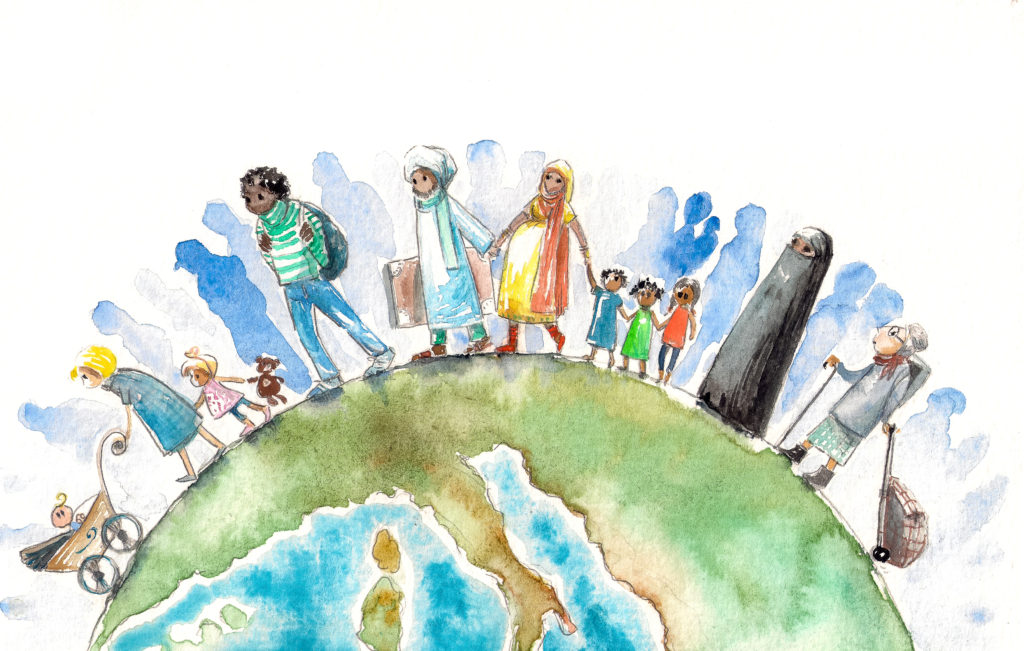 When I was advertising the information evening for the community sponsorship of refugees in our local community, I put a post on our local community Facebook page. One of the first responses I had was from a lady who said something along the lines of: ‘Why are you letting these people in when our people don’t have anywhere to live?’ Someone else piped up calling her a racist bigot who didn’t care about the horrors Syrian refugees had been through, and this continued back and forth for a few hours until the moderator took the discussion down.
When I was advertising the information evening for the community sponsorship of refugees in our local community, I put a post on our local community Facebook page. One of the first responses I had was from a lady who said something along the lines of: ‘Why are you letting these people in when our people don’t have anywhere to live?’ Someone else piped up calling her a racist bigot who didn’t care about the horrors Syrian refugees had been through, and this continued back and forth for a few hours until the moderator took the discussion down.
To whom do we owe our love? Two competing answers to this question were rehearsed in this short Facebook exchange which seemed to encapsulate the divisions that had been building for decades in Western nations, brought to light so evidently with Brexit and Trump. Continue reading “Refugee Week 1: Why Should Christians Welcome Refugees?”
The Times they are a-changin’
By Nick Coke
This article first appeared in the January-February 2017 edition of ‘The Officer’ magazine and is re-published with permission.
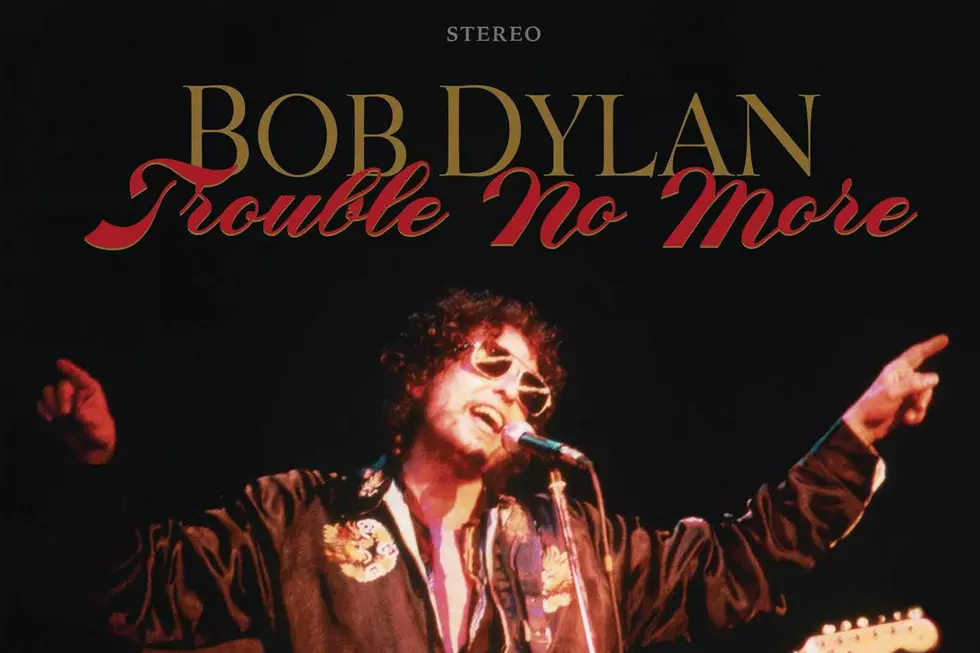
Bob Dylan is my hero. There, I’ve gone and said it! Some might laugh at the suggestion, others cringe and perhaps there are even those who wonder who on earth he is. Let me help you understand.
Bob Dylan is an American singer and songwriter, born Robert Zimmerman in Minnesota in 1941. Rising to prominence as a folk singer, he is accredited as a pioneer of the 1960s counterculture and the voice of a generation. His early songs accompanied the civil rights movement, and he even shared a stage with Martin Luther King on the day the Rev King delivered his ‘I have a dream’ speech in 1963.
Fostering Carers: how working for justice changes us too
Following the passage of the Dubs Amendment, the Home Office is consulting with local authorities to determine how many unaccompanied children the UK will be able to accept. Since each council’s pledge will be determined by its fostering capacity our local Refugee Welcome Team has been working to promote fostering in Redbridge.
We’ve held an evening to promote fostering to those within our faith communities and to ask the Leader of the Council, Jas Athwal, to pledge to accept five Syrian refugee children. The evening featured presentations from CORAM, Home for Good and Redbridge Council about fostering, as well as testimony from Ernest, who came to the UK as an unaccompanied Albanian refugee, and Farduous, who came here as a Syrian refugee.
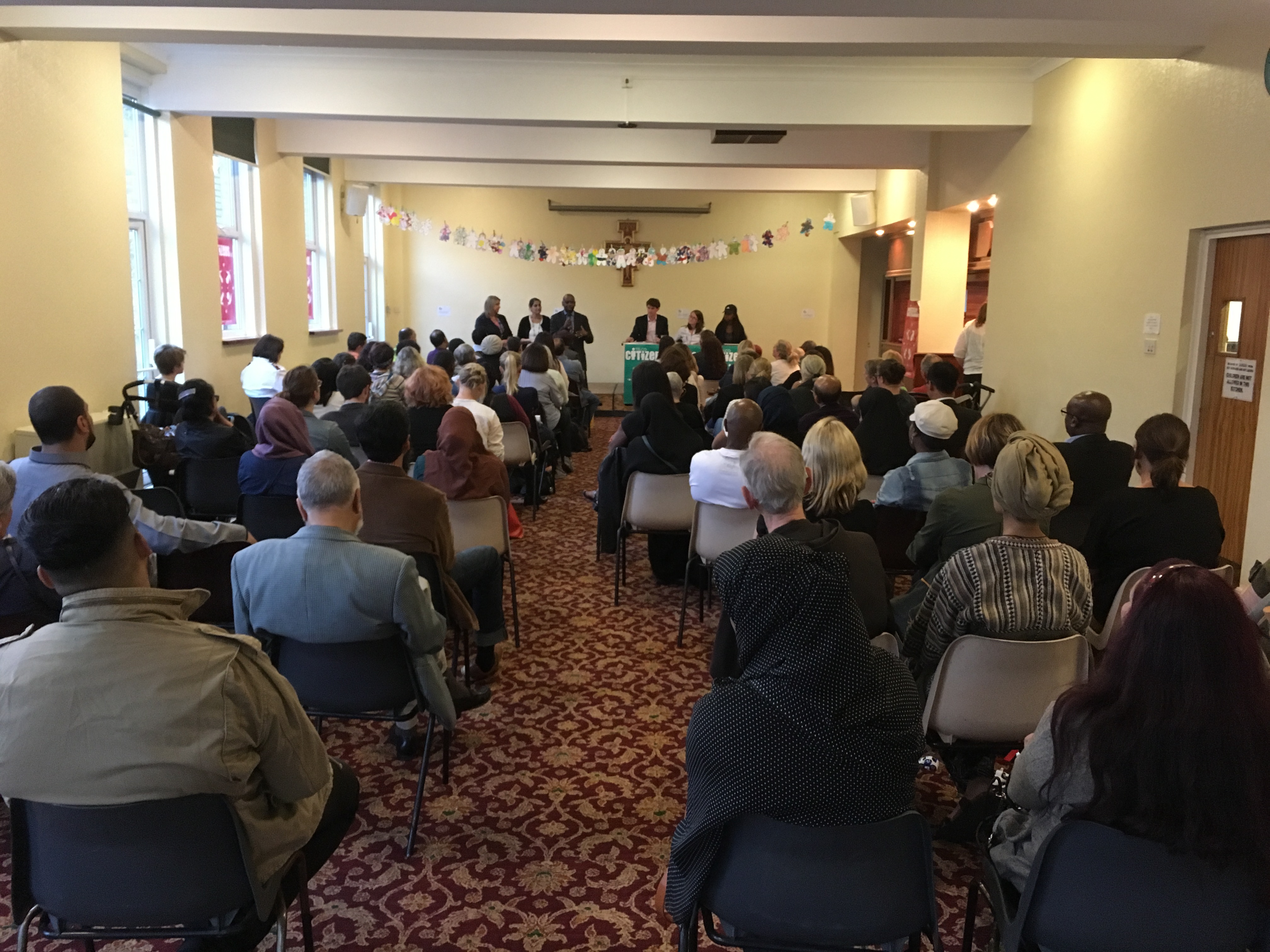
Following the action, we took time to evaluate. This was an opportunity to celebrate people who had done well, congratulate individuals who had developed their skills and recognise leaders who had brought others to participate in public life. It was also an invaluable chance to learn specific lessons about community organising. How did you feel? What had gone well? What could we have done better? What had changed as a result of the evening?
My instinctive response to the final question surprised me. It wasn’t the answer I or anyone else was expecting. Because the answer was me. I had changed.
Before the fostering event, I and another member of the team went to meet representatives from the council for a pre-negotiation. I came away thinking that we were asking for the impossible. And so before our event I was a nervous wreck – what was I going to do if the Leader of the Council tried to deflect the question or, even worse, refused outright. I wondered, should we ask for something smaller – maybe ask for less children, maybe not even ask him to commit to act at all. But with the encouragement of others on the team, I found the courage to live with the tension and ask anyway.
Justice seeking demanded that I broke free from my concern about looking foolish. It required that I was prepared to fail if the Leader didn’t give us what we wanted. I needed to ignore my natural inclination to play it safe and disturb the present to better the future.
Of course, this wasn’t all that had changed. Together we had secured a commitment from the Leader of the Council to accept unaccompanied refugee children under the Dubs amendment, although we were disappointed he would not commit to a specific number in contrast to the Leader of the Council in Hammersmith & Fulham, Stephen Cowan, who committed to his borough resettling at least 10 unaccompanied children. Furthermore, we had recruited sixteen potential foster carers. But nonetheless, the change in me is important because it makes me a little bit more who God would have me be.
When the prophet Micah questions what the Lord requires of his people, he responds ‘ To act justly and to love mercy and to walk humbly with your God.’ (6:8)
God’s intention is that our justice seeking, our acts of compassion and our rhythms of discipleship are integrated and interconnected; each a vital and connected part of our spiritual formation.
Justice seeking inevitably arises from a frustration with acts of compassion that serve the suffering but don’t address the causes of the misery, However, justice seeking should also shape our acts of compassion so we serve in ways that empower and bestow dignity rather than foster dependence. Similarly, while justice seeking is an important expression of our discipleship, it is also a place where we are spiritually formed as God challenges us to change, highlighting the places where our character isn’t consistent with the person of Jesus and giving opportunity for the fruit of the Spirit to grow within us.
However, Adele Calhoun reminds us ‘experiences don’t necessarily bring wisdom, nor do they automatically transform us. We need to listen and reflect on our experiences in the presence of the Holy Spirit to learn from them’ (Spiritual Disciplines Handbook 2005: 57). It’s important that we take time to pay attention to how our justice seeking is shaping who we are, allowing it to transform us into the image of Christ.
Some prompts for reflection:
- What do you personally find most challenging about justice seeking? Ask God to show you how this might be connected to aspects of your personality where He is leading you to change to become more like Jesus.
- Look back over your diary for the last month – how much time have you invested in justice seeking, in acts of compassion and in rhythms of discipleship? Is there a particular area you’re not investing in enough?
- Next time you engage in an act of justice-seeking, ask yourself ‘what’s changed?’ and write about this in your journal
Opportunities for Action:
Since January, when a small group of children were reunited with their families at St Pancras Station, another 178 children have been identified, living in terrible conditions in Calais, who have a right to be reunited with their families here in the UK. Disappointingly, the government has transferred less than 50. Worse still there are 14 waiting for up to 10 weeks, whose travel has been fully approved. It’s not good enough.
In addition to this, The Welcome Summit on Saturday 10th September is a gathering for the groups behind the Refugees Welcome movement from right across the country.
It’s a moment, one year on from the tragic death of Aylan Kurdi, to come together and celebrate what we’ve achieved, take stock of the British response to date, and to plan, train and act together to build a more welcoming Britain. We will also use the time to build accountable relationships with key actors, from government ministers to UN agencies, around key issues including the protection of refugee children, development of community sponsorship, and building of strong communities.
You can read more about the details of the day here, and register your attendance here.
Five Ways to Live Post-Brexit
by Nick Coke and John Clifton
Let’s get a few things straight from the outset.
One of us voted in, the other out. Neither of us are racist, nor are we members of a sneering elite. We’re not interested in blame, counter-blame or accusation. We agree on this: neither remaining in nor leaving the EU is the answer to all the questions that the people of the UK are asking.
We both live in London although we’re not from London. One of us grew up in the post-industrial north of England, the other in various countries around the world. We have both spent years investing in people at all levels of society because that’s what Salvation Army officers are called to do. We both love Jesus and try to follow him. We both love politics and get involved where we are.
Whilst we voted differently we share a vision of what’s next in a post-Brexit Britain. It is not theory. We know it works because we’ve done it, experienced it, seen people empowered by it, tasted God’s kingdom in it and seen communities changed by it. We describe it here as a picture of hope.
And, of course, hope is an action.
Justice rolling like a river: the fight for clean water in Kenya
Guest post by cadet Richard Bradbury
“But let justice roll down like waters, and righteousness like an ever flowing stream.”
Amos 5 : 24
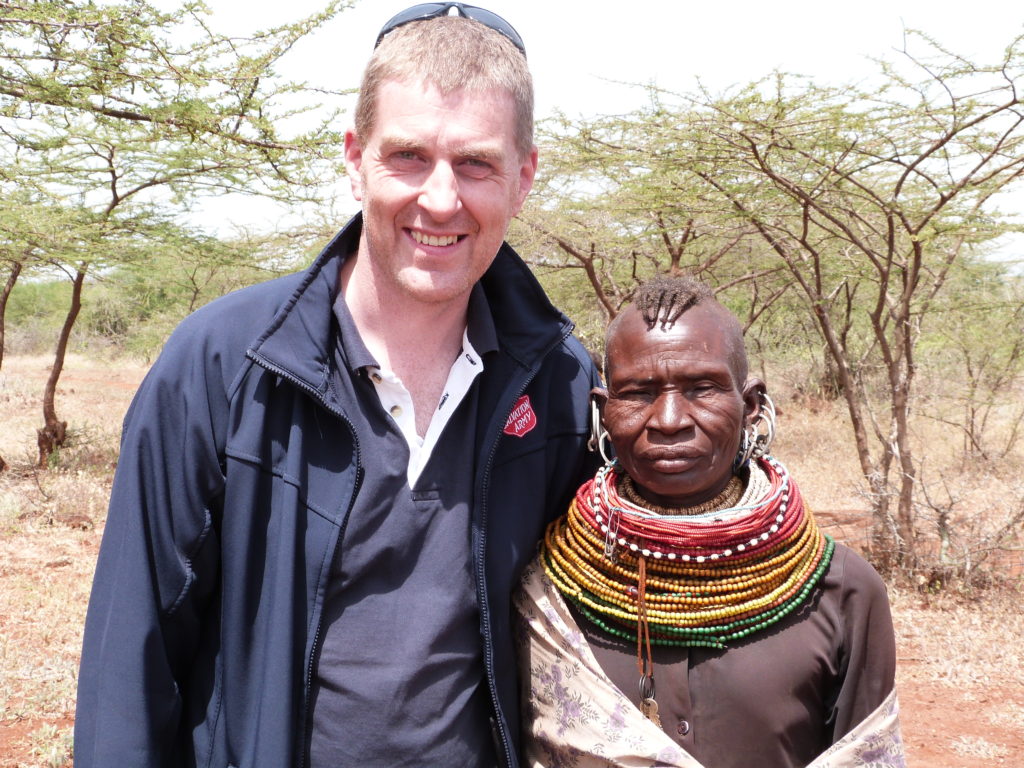
I know there is a much wider story here but it has always intrigued me why Amos chose water as a symbol of justice and righteousness. The back story to this commonly quoted verse in social justice spheres is quite clear but this reference is to water is fascinating. Israel appears to be a strong, prosperous people and doing all the things it is supposed to be doing, but God (and Amos) knows that this is just a big, fat front. Beneath the facade of their perceived faithfulness lays corruption, abuse, and greed. This brings wealth and power to some at the expense of others and this makes Amos really, really angry. He rebukes the Israelites strongly for their failure to keep the covenant, which is rooted in justice, and attacks their hypocrisy and their lack of compassion for others. And then he finishes his outburst by uniting justice and waters in the same sentence. They immediately become metaphorical and significant partners! Continue reading “Justice rolling like a river: the fight for clean water in Kenya”

